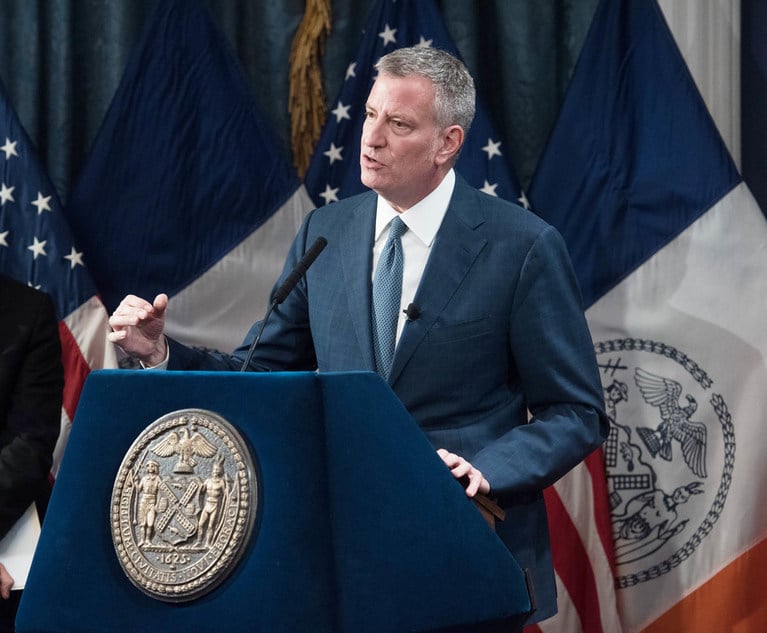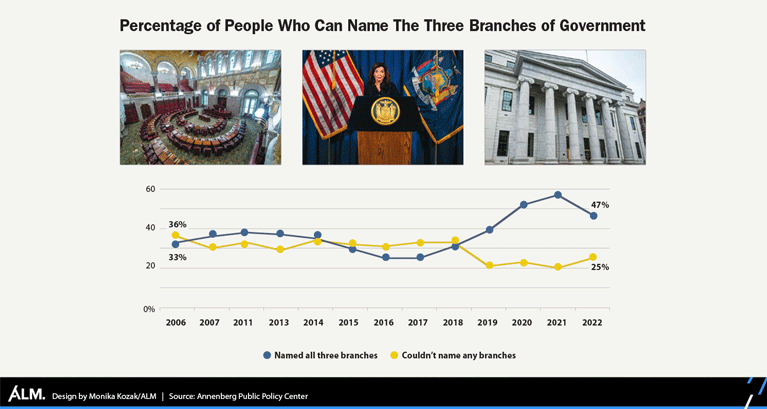 A New Yorker put an "I Voted" sticker on his jacket after voting in Brooklyn in the 2020 election. "If young people see that they can play a role in the development of society and the law, even before they are old enough to vote or serve on a jury, they will feel more empowered to exercise their rights and, consequently, help to strengthen our democracy," First Department Presiding Justice Dianne T. Renwick writes. Photo: Ryland West/ALM
A New Yorker put an "I Voted" sticker on his jacket after voting in Brooklyn in the 2020 election. "If young people see that they can play a role in the development of society and the law, even before they are old enough to vote or serve on a jury, they will feel more empowered to exercise their rights and, consequently, help to strengthen our democracy," First Department Presiding Justice Dianne T. Renwick writes. Photo: Ryland West/ALM Our Votes Shape The 'Very Heart of the Democracy': New York Celebrates Law Day 2024
Leaders of the bench and bar discuss civic engagement and what lawyers can do to promote and protect democracy.
May 01, 2024 at 02:38 PM
4 minute read
By Joseph A. Zayas, Chief Administrative Judge, New York State Unified Court System
Understanding how elections work is essential to any basic understanding of how democracies function. But New Yorkers, in my experience, know very little about how judges are chosen in our state, even though most people appreciate that the courts have a profound impact on their lives.
By Norman St. George, First Deputy Chief Administrative Judge, New York State Unified Court System
As a court system, we must educate the public and our youth about the role of the Judiciary and the importance of our courts in our democratic system of government.
By Dianne T. Renwick, Presiding Justice, First Department
We will pursue our mission of creating the next generation of engaged citizens by educating students on how our laws are implemented, expanding their understanding of our judicial system, and exposing them to career opportunities in the courts.
By Hector D. LaSalle, Presiding Justice, Second Department
The ability to exchange ideas with others around the globe in real time is a technological marvel that has provided the world with considerable positive outcomes. Conversely, the digital world has also provided society with situations not immediately apparent in 1996.
By Elizabeth A. Garry, Presiding Justice, Third Department
The authority and legitimacy of courts to resolve legal disputes lies at the very heart of the democracy that we shape through our vote.
By Gerald J. Whalen, Presiding Justice, Fourth Department
Regardless of their judicial philosophy, judges want very much to reach a just result in each case. In this way, we endeavor to fulfill our obligation to work toward the most equitable interpretation of the law, and to allow the voices of democracy to be fairly heard.
By Richard C. Lewis, President, New York State Bar Association
When more young people vote and get involved, more people listen to their voices. Part of the problem is that Americans—especially young voters—are overwhelmingly not informed about civics and how our government works.
By Jerry H. Goldfeder, Chair, Task Force on Voting Rights and Democracy
Bar associations and a variety of civic groups across the country are working overtime to preserve our democratic norms and the rule of law—and these efforts are deep and broad.
By Susan J. Kohlmann, President, New York City Bar Association
What can lawyers do about disinformation? What they do best: Speak! The sentiment among our panel was that while our national politics seem toxic, there tends to be more of a sense of community and willingness to reach across the partisan divide on the local level.
By Marcy L. Kahn and Alan Rothstein, Co-Chairs, Task Force on the Rule of Law
A threat to an election worker is a threat to our democracy. Those who pitch vitriol at these dedicated public servants seek to undermine our trust in what they do, and thereby our trust in the worth of elections.
Giving a Stronger Voice to Smaller Donors By Joanna Zdanys, Senior Counsel, and Marina Pino, Counsel, Brennan Center for Justice
New York's Public Campaign Finance Program, which boosts the value of constituents' small campaign donations with government funding, is in effect for the first time for the 2024 state legislative elections. This is an investment in civic participation at a time when American democracy really needs it.
The Case for Moving NYC Elections to Even-Numbered Years By Frederick P. Schaffer
Consolidating city elections with races for president or governor is the easiest way to increase the number of New Yorkers voting in races for key city offices. Not only will this dramatically boost voter turnout, it will lead to a more diverse, inclusive electorate.
NOT FOR REPRINT
© 2025 ALM Global, LLC, All Rights Reserved. Request academic re-use from www.copyright.com. All other uses, submit a request to [email protected]. For more information visit Asset & Logo Licensing.
You Might Like
View All
Ex-NYC Mayor de Blasio Must Pay $475K Fine for NYPD’s Presidential Campaign Security
3 minute read
Read the Document: DOJ Releases Ex-Special Counsel's Report Explaining Trump Prosecutions
3 minute read
Preparing for 2025: Anticipated Policy Changes Affecting U.S. Businesses Under the Trump Administration
Trending Stories
- 1Charlie Javice Fraud Trial Delayed as Judge Denies Motion to Sever
- 2Holland & Knight Hires Former Davis Wright Tremaine Managing Partner in Seattle
- 3With DEI Rollbacks, Employment Attorneys See Potential for Targeting Corporate Commitment to Equality
- 4Trump Signs Executive Order Creating Strategic Digital Asset Reserve
- 5St. Jude Labs Sued for $14.3M for Allegedly Falling Short of Purchase Expectations
Who Got The Work
J. Brugh Lower of Gibbons has entered an appearance for industrial equipment supplier Devco Corporation in a pending trademark infringement lawsuit. The suit, accusing the defendant of selling knock-off Graco products, was filed Dec. 18 in New Jersey District Court by Rivkin Radler on behalf of Graco Inc. and Graco Minnesota. The case, assigned to U.S. District Judge Zahid N. Quraishi, is 3:24-cv-11294, Graco Inc. et al v. Devco Corporation.
Who Got The Work
Rebecca Maller-Stein and Kent A. Yalowitz of Arnold & Porter Kaye Scholer have entered their appearances for Hanaco Venture Capital and its executives, Lior Prosor and David Frankel, in a pending securities lawsuit. The action, filed on Dec. 24 in New York Southern District Court by Zell, Aron & Co. on behalf of Goldeneye Advisors, accuses the defendants of negligently and fraudulently managing the plaintiff's $1 million investment. The case, assigned to U.S. District Judge Vernon S. Broderick, is 1:24-cv-09918, Goldeneye Advisors, LLC v. Hanaco Venture Capital, Ltd. et al.
Who Got The Work
Attorneys from A&O Shearman has stepped in as defense counsel for Toronto-Dominion Bank and other defendants in a pending securities class action. The suit, filed Dec. 11 in New York Southern District Court by Bleichmar Fonti & Auld, accuses the defendants of concealing the bank's 'pervasive' deficiencies in regards to its compliance with the Bank Secrecy Act and the quality of its anti-money laundering controls. The case, assigned to U.S. District Judge Arun Subramanian, is 1:24-cv-09445, Gonzalez v. The Toronto-Dominion Bank et al.
Who Got The Work
Crown Castle International, a Pennsylvania company providing shared communications infrastructure, has turned to Luke D. Wolf of Gordon Rees Scully Mansukhani to fend off a pending breach-of-contract lawsuit. The court action, filed Nov. 25 in Michigan Eastern District Court by Hooper Hathaway PC on behalf of The Town Residences LLC, accuses Crown Castle of failing to transfer approximately $30,000 in utility payments from T-Mobile in breach of a roof-top lease and assignment agreement. The case, assigned to U.S. District Judge Susan K. Declercq, is 2:24-cv-13131, The Town Residences LLC v. T-Mobile US, Inc. et al.
Who Got The Work
Wilfred P. Coronato and Daniel M. Schwartz of McCarter & English have stepped in as defense counsel to Electrolux Home Products Inc. in a pending product liability lawsuit. The court action, filed Nov. 26 in New York Eastern District Court by Poulos Lopiccolo PC and Nagel Rice LLP on behalf of David Stern, alleges that the defendant's refrigerators’ drawers and shelving repeatedly break and fall apart within months after purchase. The case, assigned to U.S. District Judge Joan M. Azrack, is 2:24-cv-08204, Stern v. Electrolux Home Products, Inc.
Featured Firms
Law Offices of Gary Martin Hays & Associates, P.C.
(470) 294-1674
Law Offices of Mark E. Salomone
(857) 444-6468
Smith & Hassler
(713) 739-1250









